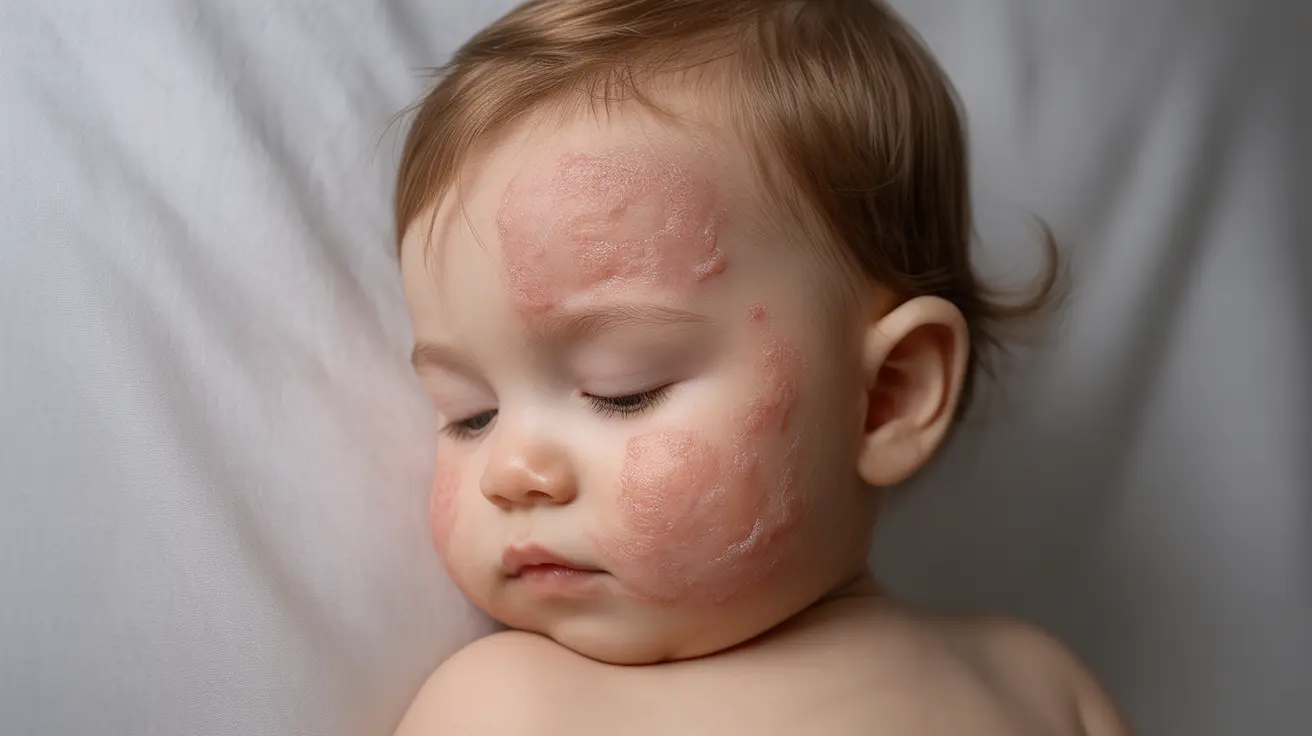When your baby develops red, itchy patches on their delicate facial skin, it can be concerning for any parent. Facial eczema in babies is a common skin condition that affects many infants, causing dry, irritated skin that requires special care and attention. Understanding how to identify and manage this condition is crucial for your baby's comfort and well-being.
This comprehensive guide will help you recognize the signs of facial eczema in babies, learn effective treatment methods, and understand how to prevent flare-ups. With proper care and management, you can help soothe your baby's sensitive skin and minimize discomfort.
Identifying Baby Facial Eczema
Facial eczema in babies typically appears as patches of red, dry, and sometimes scaly skin. Common areas affected include the cheeks, forehead, and around the mouth. The skin may appear:
- Red and inflamed
- Dry and rough
- Itchy and irritated
- Slightly raised or bumpy
- Sometimes oozing or crusty
Unlike typical baby acne or drool rash, eczema tends to be more persistent and may cause significant discomfort for your little one. The condition can appear as early as 2-3 months of age, though it may develop at any time during infancy.
Common Triggers and Causes
Understanding what triggers facial eczema in babies can help you better manage the condition. Common triggers include:
- Environmental factors (dry air, heat, cold)
- Certain fabrics or materials
- Harsh soaps and skincare products
- Food allergies or sensitivities
- Saliva or drool
- Environmental allergens
Essential Skincare Steps
Gentle Cleansing Routine
Maintaining proper skin hygiene is crucial for managing baby facial eczema. Use lukewarm water and gentle, fragrance-free cleansers specifically formulated for sensitive baby skin. Limit bathing time to prevent skin from drying out.
Proper Moisturizing Techniques
Apply moisturizer immediately after bathing while the skin is still slightly damp. Choose thick, fragrance-free creams or ointments designed for eczema-prone skin. Focus on:
- Using generous amounts of moisturizer
- Applying multiple times throughout the day
- Being extra gentle when applying to avoid irritation
- Selecting products with minimal ingredients
Treatment Options and Management
Natural Remedies
Several natural approaches can help manage baby facial eczema:
- Coconut oil for its antimicrobial properties
- Colloidal oatmeal baths
- Cool compresses for inflammation
- Maintaining optimal room humidity
Medical Treatments
When natural remedies aren't enough, your pediatrician may recommend:
- Prescription steroid creams for severe flare-ups
- Non-steroidal topical medications
- Antihistamines for severe itching
- Specialized prescription moisturizers
Prevention Strategies
Preventing flare-ups is essential for managing baby facial eczema. Key prevention strategies include:
- Keeping nails trimmed to prevent scratching
- Using soft, cotton clothing
- Maintaining optimal room temperature and humidity
- Avoiding known triggers
- Regular moisturizing routine
Frequently Asked Questions
What are the common symptoms of baby eczema on the face and how can I recognize it?
Baby facial eczema typically presents as red, dry, and itchy patches on the skin. You may notice rough, scaly areas, particularly on the cheeks and forehead. The affected skin might appear swollen, and your baby may show signs of discomfort by rubbing their face.
How should I care for and moisturize my baby's facial eczema to reduce itching and dryness?
Use gentle, fragrance-free cleansers and apply thick moisturizers immediately after bathing while skin is still damp. Reapply moisturizer throughout the day, especially in dry conditions. Choose products specifically designed for eczema-prone baby skin.
What triggers or causes baby eczema on the face, and how can these be avoided?
Common triggers include harsh skincare products, environmental factors (like dry air or temperature changes), certain fabrics, and food allergies. Avoid potential triggers by using gentle products, maintaining consistent room temperature and humidity, and keeping a diary to identify specific triggers.
When should I consider using medicated creams or see a doctor for my baby's facial eczema?
Consult a doctor if the eczema is severe, causes significant distress, interferes with sleep, shows signs of infection (oozing, severe redness, or fever), or doesn't improve with regular moisturizing and gentle skincare.
What are the safest and most effective treatments available for baby eczema on the face?
The safest approach starts with gentle skincare and regular moisturizing. For moderate to severe cases, doctor-prescribed treatments like mild steroid creams or non-steroidal alternatives can be effective. Always follow your healthcare provider's guidance for prescription treatments.




